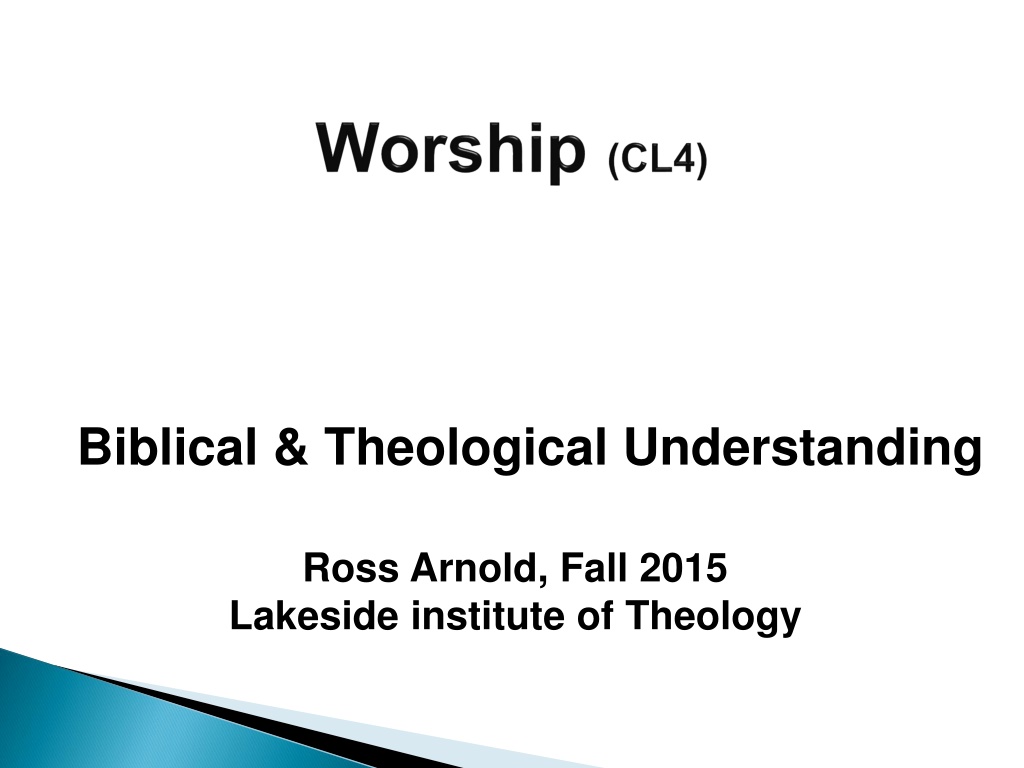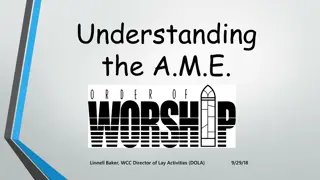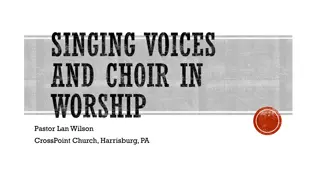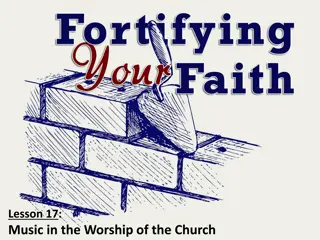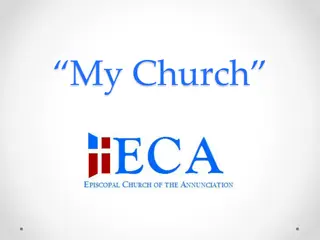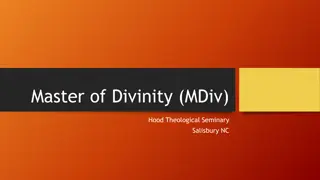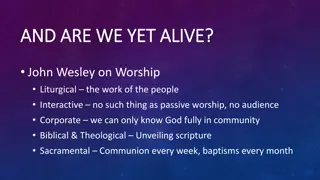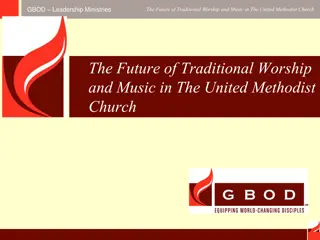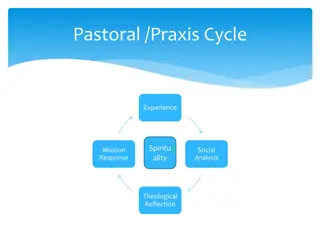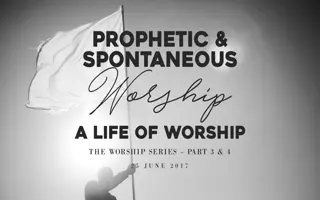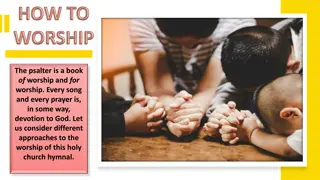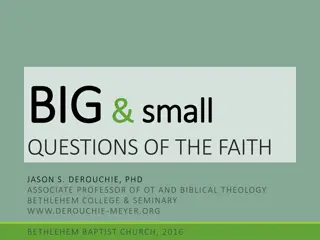Understanding Biblical and Theological Aspects of Worship
Exploring the historical evolution of Christian worship, this text delves into the practical significance of worship, including glorifying, praising, and exalting God. It addresses the reasons for worship, its location implications, specific worship actions, and the concept of false worship.
Download Presentation

Please find below an Image/Link to download the presentation.
The content on the website is provided AS IS for your information and personal use only. It may not be sold, licensed, or shared on other websites without obtaining consent from the author. Download presentation by click this link. If you encounter any issues during the download, it is possible that the publisher has removed the file from their server.
E N D
Presentation Transcript
Biblical & Theological Understanding Ross Arnold, Fall 2015 Lakeside institute of Theology
Worship (CM5) Oct. 1 Intro to Christian Worship Oct. 8 Biblical & Theological Understanding Oct. 15 Inviting God to Church Oct. 22 Worship, Renewal and Community Oct. 29 Worship Wars: Traditional vs. Contemporary Music Nov. 5 Liturgy & Elements of Worship Nov. 12 Worship in a Postmodern World Nov. 19 Conclusion; Final Exam
A Brief History of Christian Worship For three Centuries, Christian worship was countercultural. In the 4th century, Christianity became legal and began adapting Roman ceremonies into it s liturgy, with an emphasis on drama & ritual. The 15th century invention of the Gutenberg press shifted worship away from enacted drama and towards the written and spoken word. The 16th century Protestant Reformation further shifted worship away from symbol and ceremony, in favor of verbal communication. The Enlightenment (17th-18th centuries) emphasized rationalism and explanation, leading to sermons & teaching as the primary purposes of worship. The 19th century Romantic movement reintroduced emotion, and revivalism was born, with emphases on singing, fervent preaching and conversions. In the 1960s music took center stage as the primary form of church communication and worship, with emphasis on contemporary music (folk and then rock), and on personal and enthusiastic experience in worship. And today pipe organs and choirs, AND electrified instruments and drums, AND multimedia presentations, video projectors, interpretive dance, drama, and
What in the most practical terms possible is worship? What does it mean to glorify God? Ascribe to the LORD the glory due his name; bring an offering and come into his courts. 9Worship the LORD in the splendor of hisholiness; tremble before him, all the earth. What does it mean to praise God? I bowed down and worshiped the Lord . I praised the Lord, the God of my master Abraham, who had led me on the right road What does it mean to exalt God? Exalt the LORD our God and worship at his footstool; he is holy. Psalm 96:8-9 Genesis 24:48 Psalm 99:5
WHY should we worship? Shout for joy to the LORD , all the earth. 2 Worship the LORD with gladness; come before him with joyful songs. 3 Know that the LORD is God. It is he who made us, and we are his; we are his people, the sheep of his pasture. Psalm100:1-3 Does it matter WHERE we worship? And the king bowed in worship on his bed 48and said, Praise be to the LORD, the God of Israel . I Kings 1:47-48 Are there specific actions that should be part of worship? There was also a prophet, Anna, the daughter of Penuel, of the tribe of Asher. She was very old; she had lived with her husband seven years after her marriage, 37 and then was a widow until she was eighty-four.She never left the temple but worshiped night and day, fasting and praying. Luke 2:36-38
What constitutes false worship? You hypocrites! Isaiah was right when he prophesied about you: 8 These people honor me with their lips, but their hearts are far from me. 9They worship me in vain; their teachings are merely human rules. Does worship require us to bow down, or at least kneel? Jehoshaphat bowed down with his face to the ground, and all the people of Judah and Jerusalem fell down in worship before the LORD. Does true worship require sacrifice? Therefore, I urge you, brothers and sisters, in view of God s mercy, to offer your bodies as a living sacrifice, holy and pleasing to God this is your true and proper worship. Matthew 15:7-9 2 Chronicles 20:18 Romans 12:1-2
What does it mean to worship in Spirit and in truth? Yet a time is coming and has now come when the true worshipers will worship the Father in the Spirit and in truth, for they are the kind of worshipers the Father seeks. 24 God is spirit, and his worshipers must worship in the Spirit and in truth. John 4:23-24 The Israelites continually worshiped false gods and idols do we do the same? You shall not make for yourself an image in the form of anything in heaven above or on the earth beneath or in the waters below. 5 You shall not bow down to them or worship them; for I, the LORDyour God, am a jealous God Exodus 20:4-5
The Israelites were ordered to kill all those who worshiped false gods? What should we do with idolaters? If your very own brother, or your son or daughter, or the wife you love, or your closest friend secretly entices you, saying, Let us go and worship other gods (gods that neither you nor your ancestors have known, 7 gods of the peoples around you, whether near or far, from one end of the land to the other), 8 do not yield to them or listen to them. Show them no pity. Do not spare them or shield them. 9 You must certainly put them to death. Your hand must be the first in putting them to death, and then the hands of all the people. 10 Stone them to death, because they tried to turn you away from the LORD your God, who brought you out of Egypt, out of the land of slavery. 11 Then all Israel will hear and be afraid, and no one among you will do such an evil thing again. Deuteronomy 13:6-11
If you were to visit ten different traditional services, you would probably come away with ten different ideas as to what exactly traditional worship is; what it values and what it detests, what it champions and what it eschews, what is permissible and what is taboo. But, and honestly the purist in me struggles to admit this sometimes, that s a good thing.It s not all about me and my preferences. It s about meaning. For sure, I do have my preferences, but I ve served six churches in five denominations in a paid capacity, and not a single one of them has done corporate worship just as I like it all the time. But at core, all of their worship practices were derived from deep meaning (not preference) that I could honor and support on a theological and contextual basis. Jonathon Aigner, 8/10/15
Worship should be inclusive. Churches often spend a lot of time and energy attempting to woo a particular demographic. We re all about families! We need a pastor who can bring in the young people! We re the church that loves kids! Enough already. Christian worship in its simplest form is the most inclusive and relevant act, as its invitation is extended to divine image-bearers from every walk of life. Open up the doors. Learn to see Jesus in people who don t look like you, don t talk like you, and don t vote like you. Don t make an idol out of kids. Love them by nurturing them in this kind of environment.
Worship should be vitally important.Im a little surprised how often I hear people say that we shouldn t talk about how we should worship. You re being divisive over the little things while people out there need to know Jesus! And there seem to be a lot of churches for whom worship is an afterthought; a low expense, low preparation endeavor. But if we don t worship well, we can t live our faith well, and we won t be the church we re called to be. Our time, thought, creativity, and financial investment should reflect the importance of our gatherings. It might seem like a waste, but it s our life and breath as followers of Christ.
Worship should be determined by theology. Everything we do in corporate worship should be dictated by what we believe about God and God s mighty acts in Jesus Christ. Bluntly, music s job is to serve the liturgy, and nothing else. Worship should tell the Christian story. As I ve said so many times, this is our calling: to remind ourselves of who we are as people shaped by the Christian story. And, once we ve established these generous parameters, our question is not What is the right (or wrong) way to worship? Instead, we must ask What elements and forms best represent the meaning of worship?
